

People with ESFP personality types are often described as spontaneous, resourceful, and outgoing. The ESFP personality type is often referred to as “the performer” or “the entertainer.”
They love being the center of attention and are often described as “class clowns.”
ESTJ Strengths
- Organization and efficiency. ESTJs are planners and list makers—orderly and scheduled.
- Dedication and commitment. No one could accuse the ESTJ of shirking, and it’s natural for this type to give 110 percent in all areas of life and exhibit boundless energy as they do
- Integrity. ESTJs demonstrate consistent integrity in roles of leadership, believing the rules apply as much to them as their subordinates.
- Stewardship. ESTJs are the gatekeepers of society. They are people who feel personally responsible for upholding the standard and formulating a very clear picture of what passes and what doesn’t.
ESTJ Weaknesses
- Judgmental. A black-and-white approach to life can be a significant pitfall for the ESTJ.
- Uncomfortable with emotions. ESTJs often fail to value emotions or take feelings into account—their own and others’—and this can make them appear harsh, abrasive, utilitarian and uncaring.
- Workaholism. While the ESTJ work ethic is to be commended, people of this type can also err on the side of workaholism and perfectionism
- Stubborn and inflexible. ESTJs are committed to their own way or perspective as objectively right, and this can impede the process of personal growth.
ESTJ Growth and Development
In order to reach their full potential, ESTJs should:
- Withhold judgment.
- Live and let live.
- Be more self-critical.
- Get in touch with their feelings.
- Take it easy.
The ESTJ at Work
At work, the ESTJ excels at organizing—people, projects, and operations. ESTJs like to be in control and often seek out management positions, preferring to be in a role where they can make decisions and enforce policies and procedures. The ideal work environment for an ESTJ is highly structured, with a clear set of expectations and an organized authority structure. The ideal job for an ESTJ allows them to use their organizational skills within a set of standardized procedures to efficiently produce a tangible product.
ESTJs in Love
In relationships, the ESTJ is dependable, responsible, and opinionated. ESTJs appreciate routine and family traditions, and want stability and security in their home life. They tend to have very structured lives and organized homes. ESTJs can be domineering, and often want to dictate schedules and procedures for the people around them. Decisive and strong-willed, they are sometimes impatient with their partners’ feelings. ESTJs want a relationship they can rely on, and one that helps them live out their ideals of a traditional home life. ESTJs value a partner who appreciates their responsibility and productivity, and one who notices the ESTJ’s tangible contributions to the relationship.
ESTJs as Parents
As parents, ESTJs insist on clear roles and expectations. They emphasize respect for authority and for the rules of the household. ESTJ parents often take control of the family and assign jobs and duties to family members, expecting that these roles be carried out without complaint. ESTJs are traditionalists with a strong appreciation for holidays, ceremonies, and cultural occasions, and often connect with their children through established rituals. The ESTJ’s ultimate goal in parenting is to raise their children to be hardworking, productive, and observant of the rules and expectations of society.
ESTJ Communication Style
ESTJs are practical, action-oriented communicators. They often assume control and communicate to organize and determine what needs to be done. ESTJs are clear about expectations and procedures; they explain the necessary steps as well as how and when tasks should be completed. They are open to debate and criticism, but want rules to be followed and work to get done. They are focused on tasks and results and have little patience for deviation or nonconformity.


